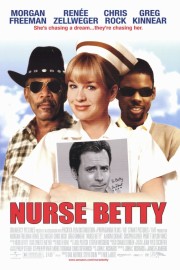Nurse Betty
Neil LaBute’s “Nurse Betty” sneaks up on you in the most surprising ways. I know it certainly took me by surprise in 2000.
This could’ve been a cruel joke. LaBute could’ve just played it for the laughs of a delusional young Kansas woman who heads out to L.A. to chase her dream guy, a character on a soap opera named David Ravell (Greg Kinnear), a heart surgeon.
Instead, it’s a beautiful fantasy, darkly comic, and oddly romantic. At the center of it all are two people who are in love with “ideals” that fall short in real-life: Betty (Renee Zellweger) with David Ravell (real name George McCord), and Charlie (Morgan Freeman)- the hit man who, with his partner Wesley (Chris Rock), took out Betty’s misogynist husband Del (Aaron Eckhart)- with Betty. By the end, both illusions are shattered in ways that are hilarious and heartbreaking.
And brutal. LaBute stages violence in this film to hurt. That’s important, because it’s Del’s death that knocks Betty off balance. She’s in the other room watching “A Reason to Love” on her birthday when Del brings Charlie and Wesley back to the house about a drug deal. Let’s face it- Del has it coming. He’s a pig; we can’t stand the way he treats Betty. But that doesn’t make the emotional effect it has on Betty any easier to watch. She now has delusions of being a nurse who will go out to Hollywood to find David, her ex-fiancee. Little does she know the car she took off of Del’s lot has drugs in it, leading Charlie and Wes to follow her across country.
Along the way, Charlie- a pro on “one last job”- begins to develop a little bit of a crush on our Betty. As he and Wes talk to her friends, family, and people she meets along the way, trying to get a picture of the woman they’re chasing, Charlie is getting a very different picture in his mind. This part of the story wouldn’t be possible were it not for Freeman, who’s possible of not just the world-weary aspects of Charlie’s personality, but also his disarming charisma- we actually begin to feel as poignantly about Charlie as we do for Betty, making their scene together at the end one of the great treats in cinema. Of course, by that time, Zellweger and Freeman have completely won us over, making this moment as rough emotionally as anything else in the film.
Following their lead is composer Rolfe Kent, whose beautiful score still ranks as one of the decade’s best, playing as much to the warm humor of the film (and John C. Richards and James Flamberg’s script) as it does the emotional journey of the characters. It doesn’t back away from the drama of the violence, which may turn some people off but is handled with care by LaBute, who is more concerned with the consequences to its’ character’s psyche than he is thrilling an audience.
Above all, the film is a wonderful comedy about the dreams people have, and the risks they sometimes have to take to make them come true. I hate that I haven’t taken the chance to give props to Chris Rock’s volatile young gun Wes, Greg Kinnear’s smarmy and prickish George, Crispin Glover and Pruitt Taylor Vince’s odd couple (as a small-town reporter and sheriff, respectively)- this is a true ensemble comedy with great material for all. But the images I keep coming back to are Zellweger’s Betty- happy for the first time in a while as she vacations in Europe- and Freeman’s Charlie- getting in touch with his sensitive side in a fantasy dance with Betty at the Grand Canyon- finding something rare in life- a moment of true happiness in an otherwise cruel world.
When I first saw the film in Fall 2000, it was about a month after my grandfather had passed away. The joy in moments like the ones above helped open my heart back up to possibilities that seemed lost to me after that loss. I wouldn’t say I felt jealous of Betty so much as hopeful that I could find that kind of joy in my life again.










